Archive for January, 2012
Winter Care for Pets
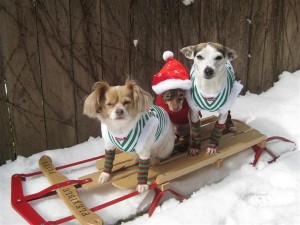 Our pets need the same things that we need during the winter months. Shelter from the elements, a warm, dry bed, Some extra food if they spent lots of time playing outdoors and plenty of fresh, clean water. In the winter, it’s especially important to keep your dog clean and well brushed. This will help maintain the natural, insulating properties of their coat. If he gets wet in the freezing rain or snow, dry him off with fluffy towels or a bow dryer. Be sure t0 clean and dry his paws each time they are exposed to rock salt or deicing chemicals. When it’s cold, keep your cat indoors as much as possible. If you do let him out, check under the hood before you start your car to make sure that he hasn’t curled up in to stay warm.
Our pets need the same things that we need during the winter months. Shelter from the elements, a warm, dry bed, Some extra food if they spent lots of time playing outdoors and plenty of fresh, clean water. In the winter, it’s especially important to keep your dog clean and well brushed. This will help maintain the natural, insulating properties of their coat. If he gets wet in the freezing rain or snow, dry him off with fluffy towels or a bow dryer. Be sure t0 clean and dry his paws each time they are exposed to rock salt or deicing chemicals. When it’s cold, keep your cat indoors as much as possible. If you do let him out, check under the hood before you start your car to make sure that he hasn’t curled up in to stay warm.
Remember, your pets count.
Adopting a feral cat
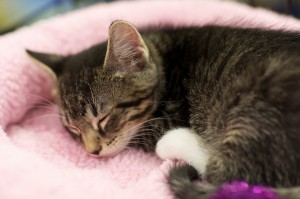 As we get into the cold winter months, you may be concerned about the feral cats that are out there trying to “brave the elements.” There’s a cat that has been under your deck that you feed but can’t be sure that it will be safe in the winter. You decide to adopt it and introduce it to the pleasures of indoor living. If the feline is friendly and you’ve already been feeding it, having it move indoors with you may not be as hard as you think.
As we get into the cold winter months, you may be concerned about the feral cats that are out there trying to “brave the elements.” There’s a cat that has been under your deck that you feed but can’t be sure that it will be safe in the winter. You decide to adopt it and introduce it to the pleasures of indoor living. If the feline is friendly and you’ve already been feeding it, having it move indoors with you may not be as hard as you think.
Litter box training is the biggest concern for most people. Place the box where you want it permanently located. In the past, if you allowed this cat inside once in awhile, place a transitional litter box near the door where she used to come in and out. As time goes on, slowly move the transitional box closer to the permanent box. Once the boxes are side by side, you can remove one of them.
If the cat was never litter box trained, a confinement method is usually necessary. Set the cat up in a large crate complete with litter box, resting place, food, water and cat toys.When the cat is consistently using the litter box, she can be moved to a small room. After she gets the hang of that, gradually increase her space. If she has a lapse, return to the last place that she kept clean.
Once she’s litter box trained, enrich her new environment. Give her access to a window sill so she can look outside. Give her some catnip or wheat grass so she can nosh on some cat safe greenery. Get her cat toys to keep her occupied. Safeguard your furniture by putting several cat scratching posts throughout the house. Cardboard scratch pads embedded with catnip are inexpensive and can be scattered throughout your home.
Even though your cat is in a safe, comfortable environment, the lure of the great outdoors may still entice them. Make sure screens are tightly secured and make sure that the door is never left open. Distract her from going for the door by rolling a toy across the floor or giving her a treat. Make sure that she is spayed. Eventually, she will be very content staying indoors and will not dash for the door anymore.
Finally, give your cat a good, healthy diet high in protein. Provide treats and lots of love and you new guest will become a beloved family member.
Remember, your pets count!
Dogs and Bones
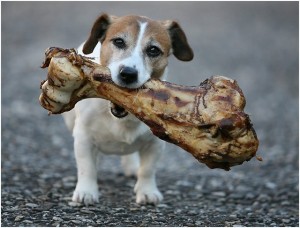 Calcium and vitamin D are essential for building your dogs bones and teeth. These nutrients are especially important for growing puppies and for pregnant and lactating dogs. Dairy products, legumes and bones themselves contain lots of calcium. Most grains and meat contain little. Veterinarians do not like it when owners feed their dog a calcium deficient diet consisting of meat and grain alone. Their dogs may develop Osteoporosis, broken bones, loose teeth and arthritis. Calcium deficiency is rare, thanks to commercial pet foods that are easily prepared and properly balanced. If you suspect a problem, your veterinarian can use X rays to check your dog’s bone density, and detect hairline fractures.
Calcium and vitamin D are essential for building your dogs bones and teeth. These nutrients are especially important for growing puppies and for pregnant and lactating dogs. Dairy products, legumes and bones themselves contain lots of calcium. Most grains and meat contain little. Veterinarians do not like it when owners feed their dog a calcium deficient diet consisting of meat and grain alone. Their dogs may develop Osteoporosis, broken bones, loose teeth and arthritis. Calcium deficiency is rare, thanks to commercial pet foods that are easily prepared and properly balanced. If you suspect a problem, your veterinarian can use X rays to check your dog’s bone density, and detect hairline fractures.
Remember, your pets count!
Popular Persians
 According to the Cat Fanciers Association, the Persian is the most popular pedigreed cat breed in the United States. It could be it’s long, beautiful coat that makes everyone love it or maybe it the Persian’s playful personality. It’s also quite and easy going and most Persians readily adapt to new households and accept other pets. This makes the breed relatively easy to care for. Persians do require extra grooming. Their large eyes are prone to tearing and infection so a Persians eyes and face should be kept clean. The breeds long fur can also become matted so they should be brushed daily. Persians are a pleasure to own and all the extra care is worth it!
According to the Cat Fanciers Association, the Persian is the most popular pedigreed cat breed in the United States. It could be it’s long, beautiful coat that makes everyone love it or maybe it the Persian’s playful personality. It’s also quite and easy going and most Persians readily adapt to new households and accept other pets. This makes the breed relatively easy to care for. Persians do require extra grooming. Their large eyes are prone to tearing and infection so a Persians eyes and face should be kept clean. The breeds long fur can also become matted so they should be brushed daily. Persians are a pleasure to own and all the extra care is worth it!
Remember, your pets count!
Calcium for your dog
 Dogs, like people require certain vitamins and minerals in their diet in order to maintain good health. Calcium is one of those minerals. Calcium plays several important roles in your dog’s body. It ensures that bones and teeth remain strong, helps keep the nerve impulses traveling smoothly, and keeps your dog’s metabolism functioning properly. When dog’s don’t get enough calcium, they can develop a serious condition called rickets. This causes the bones to become soft and they can bend or break easily. Growing puppies, mother dogs who are nursing pups, and dogs who can’t metabolize calcium properly may need an extra calcium supplement to stay healthy. Your veterinarian can recommend the best way to provide it.
Dogs, like people require certain vitamins and minerals in their diet in order to maintain good health. Calcium is one of those minerals. Calcium plays several important roles in your dog’s body. It ensures that bones and teeth remain strong, helps keep the nerve impulses traveling smoothly, and keeps your dog’s metabolism functioning properly. When dog’s don’t get enough calcium, they can develop a serious condition called rickets. This causes the bones to become soft and they can bend or break easily. Growing puppies, mother dogs who are nursing pups, and dogs who can’t metabolize calcium properly may need an extra calcium supplement to stay healthy. Your veterinarian can recommend the best way to provide it.
Remember, your pets count!
The big Chihuahua cover up – why do they always snuggle under the covers?
 Did you know that Chihuahua dogs have tons of personality. One of their most endearing habits is to snuggle under blankets or clothes. We really don’t know why they do this but there are several theories. One is that it’s a natural instinct. One that is encoded in their genes. Their wild ancestors probably slept and raised their young in burrows. It’s also possible that snuggling under blankets makes these excitable little dogs feel safe and secure. Maybe it’s just warm and cozy for them. Chihuahua’s, especially the smooth coated variety don’t have much hair and get cold easily. Whatever the reason, Chihuahua owner have to be very careful not to sit on a dog hidden beneath a throw or comforter.
Did you know that Chihuahua dogs have tons of personality. One of their most endearing habits is to snuggle under blankets or clothes. We really don’t know why they do this but there are several theories. One is that it’s a natural instinct. One that is encoded in their genes. Their wild ancestors probably slept and raised their young in burrows. It’s also possible that snuggling under blankets makes these excitable little dogs feel safe and secure. Maybe it’s just warm and cozy for them. Chihuahua’s, especially the smooth coated variety don’t have much hair and get cold easily. Whatever the reason, Chihuahua owner have to be very careful not to sit on a dog hidden beneath a throw or comforter.
Remember, your pets count!
Shelter and feeding for an outdoor cat
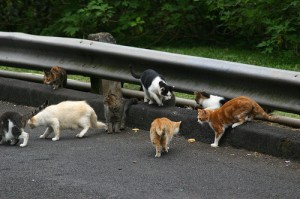 If you’re like me you may wonder how those feral cats can survive the winter. Many feral cats seek shelter under car engines, porches or any area where they could find warmth. Sometimes we’re tempted to feed feral cats but the problem is that they’ll keep coming back for their meal every day. I know someone who loves and feeds several feral cats that drop by her townhouse everyday. She recently received a letter from the condo board telling her that she must stop feeding these cats or else she would be fined. Unfortunately, there are many pet “unfriendly” condos out there. I know that this person is probably feeling bad and worrying about how these cats will get their food. Here are some things that you could do to protect our feral feline friends.
If you’re like me you may wonder how those feral cats can survive the winter. Many feral cats seek shelter under car engines, porches or any area where they could find warmth. Sometimes we’re tempted to feed feral cats but the problem is that they’ll keep coming back for their meal every day. I know someone who loves and feeds several feral cats that drop by her townhouse everyday. She recently received a letter from the condo board telling her that she must stop feeding these cats or else she would be fined. Unfortunately, there are many pet “unfriendly” condos out there. I know that this person is probably feeling bad and worrying about how these cats will get their food. Here are some things that you could do to protect our feral feline friends.
In cold weather, shelter is actually more important for stray and feral cats than food.
- Freezing winds, snow and rain can cause frostbite of the ears and paws if colony cats cannot find a dry, wind-proof shelter.
- Even though feral cats build thicker coats for winter, they can quickly succumb to hypothermia, particularly in rain and snow when their fur gets wet and doesn’t insulate as well.
You can build a simple shelter and place it away from the condo complex but put it within your own reach. The best place would be a wooded area away from people. The shelter could be made from a 30 gallon plastic tote. Cut a hole in the tote. Insert a Styrofoam cooler inside the plastic tote and cut a round hole to match the hole that you cut in the tote. It should be big enough for the cat or cats to get in. Add straw and then a lid on the Styrofoam Cooler. Place the lid on the tote and you’re done! You can place food in this shelter every day. You’ll now feel that you are protecting our outdoor feline friends and providing them enough food to survive the tough winter. The great thing is that the shelter could be used all the time!
Remember, your pets count.
Dogs in the cold
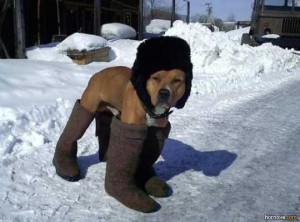 Snow and ice can bother a dog’s feet but most medium or large breeds could still go on a winter run or walk. A rule of thumb for the average Lab is that if you could exercise without a face mask, he should do fine but wash his feet off when he comes inside. Dogs who lick road salt off their paws could develop a skin irritation between their toes. Many large dogs could even stay in the yard on a winter day if they have a dry shelter. Short, small breeds like Chihuahua’s may never be comfortable in the cold. You may even consider putting booties on them to prevent frostbite and protect their paws from sharp ice. No matter what precautions that you take, if your dog shivers or becomes listless, get her inside right away!
Snow and ice can bother a dog’s feet but most medium or large breeds could still go on a winter run or walk. A rule of thumb for the average Lab is that if you could exercise without a face mask, he should do fine but wash his feet off when he comes inside. Dogs who lick road salt off their paws could develop a skin irritation between their toes. Many large dogs could even stay in the yard on a winter day if they have a dry shelter. Short, small breeds like Chihuahua’s may never be comfortable in the cold. You may even consider putting booties on them to prevent frostbite and protect their paws from sharp ice. No matter what precautions that you take, if your dog shivers or becomes listless, get her inside right away!
Remember, your pets count.
Diet and your pets imune system
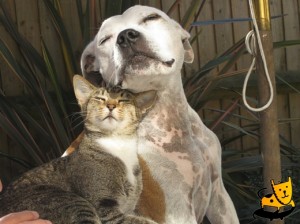 Just like our immune system, your pets immune system is working all the time. It wards of viruses, bacteria and other foreign invaders that could make your pet sick. If any of these foreign matters break through your pets system, a cellular fighting force is deployed to destroy them. Your pet needs a vigorous immune response to survive and what they eat plays an important role in your pets immune system. That’s why your pet’s diet needs to be balanced in terms of certain nutrients such as proteins and fats as well as key vitamins and minerals like zinc, selenium and vitamin C. Too much of one element could be just as detrimental as too little. Ask your veterinarian for a recommendation.
Just like our immune system, your pets immune system is working all the time. It wards of viruses, bacteria and other foreign invaders that could make your pet sick. If any of these foreign matters break through your pets system, a cellular fighting force is deployed to destroy them. Your pet needs a vigorous immune response to survive and what they eat plays an important role in your pets immune system. That’s why your pet’s diet needs to be balanced in terms of certain nutrients such as proteins and fats as well as key vitamins and minerals like zinc, selenium and vitamin C. Too much of one element could be just as detrimental as too little. Ask your veterinarian for a recommendation.
Remember, your pets count.
